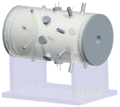Differential ultrasonic calorimeter for accurate measurement of thermal losses in machinery
Abstract
Ultrasonic sensors can rapidly respond to changes in average temperature across the complete ultrasonic pathway, a response rate which is difficult to achieve using conventional temperature sensing technologies. This research investigates ultrasound calorimetry and its advantages over calorimetry implemented using conventional temperature sensors, in order to accurately estimate heat losses in electrical motors.
The ultrasonic calorimeter is based upon ultrasonic oscillating temperature sensors which have been successfully demonstrated for temperatures changing in a single direction (increasing or decreasing). However, a hysteresis effect was observed when analysing the temperature-frequency relationship recorded for temperature changes occurred in both directions; some analysis and explanations are provided for the possible reasons for this effect in the piezoelectric transducers deployed for the oscillating sensor.
This major electronic development part of this project is to develop the design of a low cost electronic driver that supports reliable operation of the oscillating ultrasonic sensors. The most general driver consists of an amplifier, a phase shifter and a band pass filter. During this year an amplifier with automatic gain control (AGC) was investigated with the view to prevent the output of the amplifier being driven into saturation, as is the case for existing designs. This development is expected to reduce the scatter in the output frequency of the sensor and improve consistency and repeatability of its readings. Several prototypes were simulated, prototyped and experimentally verified; the best amplifier developed so far is being experimentally tested under various conditions.
An evaluation of different arrangements of electronics for ultrasonic oscillating sensors was conducted. Several hundred hours of overnight measurements were completed to establish the best arrangements and parameters for operations.
In order to establish reliable and accurate frequency measurements, a PSoC based frequency meter was developed. Several clocking and referencing options were examined in order to achieve high accuracy and high speed measurement of the output frequency of the sensor under various environmental conditions.
Aim
To develop experimental setup and electronic instrumentation capable of measuring thermal losses in water cooled electrical motors with high accuracy.
Objectives
- Develop and verify sensor electronics using PSoCs
- Elaborate and verify the data fusion procedure for the sensor
- Design the experimental test rig
- Measure losses of a water cooled motors experimentally
- Attempt to extend the developed instrumentation to measurement of heat losses of air cooled machinery
